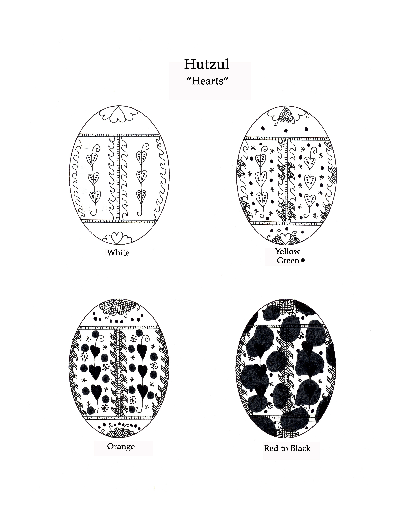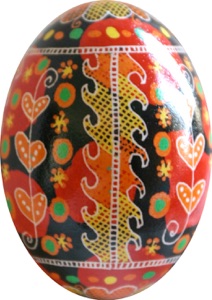Hutsul
Гуцульщина
Hutsul
Гуцульщина

A friend of mine told me that he had read once that, up until about three hundred years ago, Hutsul pysanky were like those in the rest of Ukraine: fairly simple designs. Then something happened, and the Hutuls went wild, creating incredibly intricate pysanky. Perhaps it was all those long winter nights isolated up in the mountains with nothing better to do. Whatever it was, the result was some of the most beautiful pysanky on earth.
This pysanka utilizes the modern Hutsul color palette: yellow, orange, red, green and black. In earlier times the colors would have been different: the black would have been a deep brown, and the red would have been less bright, a richer, darker hue. I has a fairly small amount of hatchwork compared to many Hutsul pysanky, especially those from Kosmach.
The design on this page is from Onyshchuk, and combines two techniques: linear batik (aka pysankarstvo) and krapanka (dripping of wax). This mixing of techniques is often seen in western Ukraine, and gives even relatively simple pysanky a higher level of complexity and more color.
The pysanka is called «серцева» (sertseva), or “the one with hearts.” Hearts are and have long been a symbol of romantic love; this is the sort of pysanka a young woman would give to her beloved.

Technical details: as with most Hutsul designs, this is a fairly complex pysanka. It is not a beginner’s pysanka; it is best attempted with a moderately skilled pysankar. Use a fine stylus for the lines, medium or heavy for waxing in.
This pattern utilizes five dyes: yellow, green (spot dye), orange, red and black.
This pysanka utilizes a barylka division (for pencil lines), with the central band having four equal divisions.
The krapanka effect can be obtained several ways. One is to drip beeswax onto the egg, but this can get messy and is difficult to control. Another is to draw and fill in the blotches with the widest bore stylus that you have (electric or traditional). Another is to use a Delrin type stylus, fill the reservoir with wax, heat is well, and then pour the wax from the open end of the reservoir to create the blotches.
Download this pattern sheet:
Back to MAIN Patterns page.
Back to MAIN Regional Pysanky page.
Back to MAIN Traditional Pysanky page.
Search my site with Google
Hearts
Серцева
